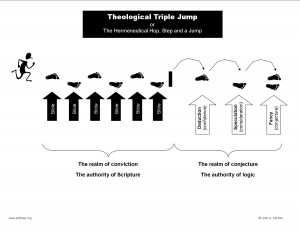3. Ascertain what the author intended to say.
When reading the Bible ask, “Did the author intend this to be literally understood or is this a figure of speech? The Bible speaks about “the four corners of the world” and the “setting of the sun.” Was the author intending to make scientific statement or simply communicating in phraseology that made sense in the day?
Does the Biblical writer commit himself to agreement with every statement he writes, or is he simply recording a statement or fact? Similarly, does the author commit himself to agreeing with or condoning the action that is recorded, or is he simply noting that it happened? 1 Samuel 31 and 2 Samuel 1 record two different reports about the death of King Saul. In 1 Samuel 31:4-6 the author says that king Saul and his armor bearer killed themselves in battle rather than fall into the hands of the enemy. However, 2 Samuel 1:9-10 contains the report of a certain Amalekite who tells David that he killed Saul and returned with his crown and bracelet. So which is it? Did Saul kill himself or did the Amalekite do it? What did the writer of Scripture commit himself to? The only place the writer of Scripture committed himself to the statement was in 1 Samuel 31, where he records that Saul killed himself. In the account of 2 Samuel 1 the writer is simply reporting the content of what the Amalekite said happened. Did the Amalekite have any reason to manufacture a story? Sure, David had been long anointed to be king and Saul had long stood in the way. The Amalekite had reason to believe that, if he reported that he had killed Saul, he would be rewarded. Too bad he misread David’s character (2 Samuel 1:11-16)!
Realize that the Biblical writers did not say everything that they could have said, but everything they did say is true. John makes very clear in his Gospel that what he wrote was selective (John 20:31). We must employ the analogy of Scripture – the comparing of Scripture with Scripture to let it be its own interpreter.
4. Realize the differences in standards for historical recording between the Hebrew and Greek cultures and our own.
When one Gospel writer calls the dominion of God the “Kingdom of Heaven” and another refers to it as the “Kingdom of God,” do we have an error? Which did Jesus say when He spoke? The standards for recording and quoting people in Hebrew and Greek cultures were not the same as they are in a society such as ours where litigation over alleged plagiarism or slander is a serious threat. So when Matthew speaks of the Kingdom of Heaven and Luke writes of the Kingdom of God, referring to the same statement by Jesus, there is no error—they both mean the same thing. When the Biblical authors write, “Jesus said …” or “Moses said …” they were not always trying to record a word-for-word rendering.
When my wife is finishing preparations for dinner, she might instruct our daughter, “Ask Daddy if he wants milk or Pepsi to drink with dinner.” When Melody comes and says, “Mommy wants to know if you want milk or Coke to drink with dinner,” is she speaking in error? No, in our house Pepsi and Coke refer to the same thing. In fact the bottle in the refrigerator might bear a label for a generic cola!
Take for example Jesus’ prayers in the Garden of Gethsemane. First He prayed, “My Father, if it is possible let this cup pass from Me; yet not as I will, but as Thou wilt.” The second time He prayed, “My Father, if this cannot pass away unless I drink it, Thy will be done.” Jesus did not say the same thing in prayer both times, but it was perfectly accurate when Matthew wrote, “He left them again, and went away and prayed a third time, saying the same thing once more” (Matthew 26:39, 42, 44).
Similarly, when Matthew, Mark and John record Peter’s famous words of confession concerning Jesus’ identity, they phrase it slightly differently. “Thou art the Christ, the Son of the living God” (Matthew 16:16). “Thou are the Christ” (Mark 9:29). “The Christ of God” (Luke 9:20). Is there error here? No, Matthew gives us the more complete record of Peter’s statement, Mark records the crucial part of it, and Luke gives us the gist.
We must allow room for the phenomena of language. Again, when the writer of Scripture speaks about the “sun rising” he is not attempting to make a scientific statement. He only wishes to designate the time of day or the phenomena of creation happening at the moment. Similarly, when Jesus said that the mustard seed is the smallest seed (Matthew 13:32) He was not attempting to make a finely tuned horticultural statement.

